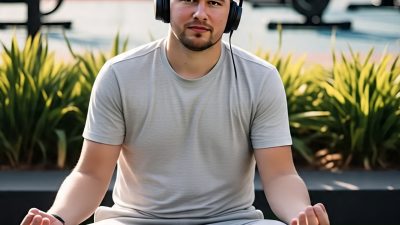When it comes to achieving weight loss goals, the most commonly asked question isn’t always about what exercise to do—it’s when. Should you lace up your sneakers at dawn or save your sweat session for after dark? The debate between Morning vs Evening Workouts has gained serious traction in fitness circles, and for good reason.
Both time slots offer unique benefits. But which is truly better for burning fat, staying consistent, and reaching your goals faster? Let’s break it down on Morning vs Evening Workouts.
Contents
- 1 The Science Behind Your Body Clock: Circadian Rhythms and Exercise
- 2 Benefits of Morning Workouts for Weight Loss
- 3 Drawbacks of Morning Workouts
- 4 Benefits of Evening Workouts for Weight Loss
- 5 Drawbacks of Evening Workouts
- 6 Morning vs Evening Workouts: What Research Says
- 7 What About Fasting Workouts in the Morning?
- 8 Sample Morning and Evening Workout Routines for Weight Loss
- 9 How to Choose: Ask Yourself These Questions
- 10 Tips for Maximizing Weight Loss—No Matter When You Train
- 11 Final Verdict: Morning vs Evening Workouts for Weight Loss
- 12 Conclusion: Find Your Rhythm and Stick to It
- 13 FAQ
The Science Behind Your Body Clock: Circadian Rhythms and Exercise
Before diving into the pros and cons of Morning vs Evening Workouts, it’s essential to understand how your body works throughout the day. Your body follows a natural internal clock known as the circadian rhythm, which regulates sleep, hormone production, body temperature, and even muscle function.
This internal timing system affects how your body responds to physical activity at different times of the day. Some key elements include:
- Core body temperature: Warmer muscles in the evening may increase strength and performance.
- Hormone levels: Testosterone peaks in the morning, which can aid in muscle building.
- Reaction time and flexibility: Often better in the afternoon or evening.
These shifts play a major role in how effective your workout can be depending on the time you train.
Read : Best Full-Body Workout Plan for Fast and Effective Fat Loss
Benefits of Morning Workouts for Weight Loss
Let’s look at why early risers might have an edge when it comes to losing weight.
1. Boosts Your Metabolism Early
One of the biggest advantages of working out in the morning is the afterburn effect—formally known as EPOC (Excess Post-Exercise Oxygen Consumption). After a high-intensity session, your body continues to burn calories even at rest.
Starting your day with movement can rev up your metabolism for hours, helping you torch more calories throughout the day.
2. Encourages Healthier Food Choices
Morning exercisers tend to make more mindful food choices. A workout can mentally reinforce your goals and make it less likely that you’ll reach for unhealthy snacks later in the day.
3. Creates a Positive Routine
Getting your workout done early means it’s less likely to get bumped by work deadlines, family obligations, or sheer exhaustion. Consistency is a huge factor in weight loss success.
4. Improves Mood and Focus
Exercise releases endorphins, which boost mood and reduce stress. Starting your day on this positive note may help reduce emotional eating—another win for weight loss.
Drawbacks of Morning Workouts
1. Lower Body Temperature
Your body is naturally cooler in the morning, meaning your muscles are less pliable. This could increase the risk of injury if you don’t warm up properly.
2. Sleep Interference
Early morning sessions can cut into your sleep, especially if you’re not going to bed early. Lack of sleep has been linked to weight gain and poor recovery.
3. Less Peak Performance
Strength, flexibility, and stamina tend to peak later in the day. Morning workouts might not allow you to train as hard, especially during high-intensity workouts or heavy lifting.
Benefits of Evening Workouts for Weight Loss
Now, let’s explore why training after work hours might actually work better for some people.
1. Higher Performance Levels
Most people are stronger, more flexible, and have better endurance in the evening due to warmer core temperatures and increased coordination. This means you can train harder and longer, which may translate into more calories burned.
2. Great Stress Reliever
Evening workouts are perfect for decompressing after a long day. Stress and cortisol levels can lead to emotional eating, and ending the day with a workout may reduce those risks.
3. Easier Warm-Ups
With your body temperature already elevated by daily activity, you may need less time to warm up, allowing you to dive into your workout more efficiently.
4. Social and Group Classes
Gyms and parks are more active in the evening. If you thrive on energy from a group or class setting, evening time may boost motivation and help you stay on track.
Drawbacks of Evening Workouts
1. Higher Chance of Skipping
After a long day, it’s easy to bail on a workout. Fatigue, errands, or late meetings can derail your consistency.
2. Sleep Disruption
For some people, late-night exercise can interfere with winding down and falling asleep, particularly if the workout is intense and ends close to bedtime.
3. Post-Workout Hunger
Working out at night may increase appetite after dinner. If not managed well, it can lead to unnecessary snacking and reverse calorie deficits.
Morning vs Evening Workouts: What Research Says
Studies are mixed. Some research suggests that morning workouts help improve fat metabolism and lead to more consistent routines. Others indicate that evening workouts result in higher performance, allowing you to push yourself harder, which could lead to greater overall calorie burn.
Ultimately, the best time to work out is the time you’ll stick with. Weight loss is about long-term consistency—not just daily timing.
What About Fasting Workouts in the Morning?
Fast workouts, or exercising on an empty stomach, are popular in the early morning. This can lead to fat oxidation, where your body uses fat as a fuel source. However, this isn’t necessarily more effective than fed workouts over time.
If you’re choosing morning workouts purely for fasting benefits, be sure you’re still getting enough nutrients throughout the rest of the day to support your weight loss goals.
Sample Morning and Evening Workout Routines for Weight Loss
Here are practical routines for both time slots that you can try right away:
Sample Morning Workout (30–40 mins)
5 min dynamic warm-up (arm swings, leg swings, jump rope)
15 min HIIT (High-Intensity Interval Training)
- 30 sec jump squats
- 30 sec rest
- 30 sec push-ups
- 30 sec rest
- Repeat 4–5 rounds
10 min core work (planks, bicycle crunches, leg raises)
5 min cooldown stretch
Sample Evening Workout (45–60 mins)
10 min warm-up jog or treadmill walk
30 min strength training
- Squats, lunges, deadlifts, shoulder presses (3 sets each)
10 min cardio finisher (elliptical, stairs, or jump rope)
5 min cooldown and foam rolling
How to Choose: Ask Yourself These Questions
If you’re still torn between morning vs. evening workouts, ask yourself the following:
- When do I feel most energized?
- Do I have time consistently at that hour?
- Do I prefer cardio or strength workouts?
- Is sleep being affected by my workout schedule?
- Am I staying consistent with my routine?
Answering these can help you find the best workout window that aligns with your life and goals.
Tips for Maximizing Weight Loss—No Matter When You Train
Regardless of the time you work out, these strategies can enhance your fat-burning results:
- Stay hydrated: Proper hydration boosts energy and performance.
- Eat protein-rich meals: Fuel your workouts and support muscle recovery.
- Track progress: Use a fitness tracker, journal, or app.
- Sleep well: Aim for 7–9 hours nightly to help with fat loss and muscle recovery.
- Be consistent: It’s better to do moderate workouts regularly than intense workouts inconsistently.
Final Verdict: Morning vs Evening Workouts for Weight Loss
When it comes to Morning vs Evening Workouts, the “better” option is ultimately the one you can stick to long-term. Both have their own science-backed advantages:
- Morning workouts may help build habits, increase energy, and support healthier food choices throughout the day.
- Evening workouts allow for greater physical performance, flexibility, and may be better for those who aren’t early risers.
Neither is right or wrong—what matters most is consistency, intensity, and overall lifestyle alignment.
So whether you rise and grind or unwind with a workout at dusk, just get moving. Weight loss success is built on routine, not the clock.
Conclusion: Find Your Rhythm and Stick to It
The answer to Morning vs Evening Workouts isn’t set in stone. Choose the time that fits your lifestyle, motivates you to show up, and supports your recovery. Whether you’re an early bird or a night owl, your consistency will always be more important than the clock.
FAQ
Are morning workouts better for weight loss than evening workouts?
Morning workouts may slightly boost fat burning by tapping into stored fat after an overnight fast. However, the best time to work out is the time you can stick with consistently—both morning and evening workouts can be equally effective for weight loss.
Do morning workouts boost metabolism more than evening workouts?
Morning workouts may increase post-exercise calorie burn (EPOC), especially if they’re intense like HIIT. But consistency, intensity, and total daily activity matter more than the time of day.
Can evening workouts affect sleep quality?
For some people, intense late-night workouts can make it harder to fall asleep. However, moderate evening exercise often helps reduce stress and may improve sleep—just avoid high-intensity training too close to bedtime.
Which time of day helps burn more fat: morning or evening?
Studies are mixed, but some show morning workouts in a fasted state may burn more fat short term. Still, total calorie burn over time is more important than when you exercise.
What’s the best time to exercise if I want to stick to a routine?
Choose a time that fits your lifestyle. Morning workouts promote consistency, while evening workouts allow for more flexibility and strength gains due to higher body temperature later in the day.


